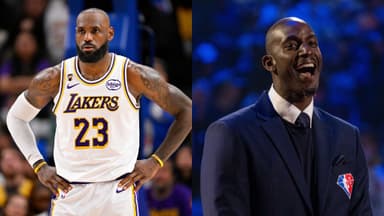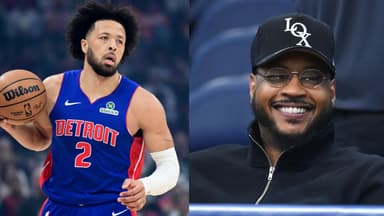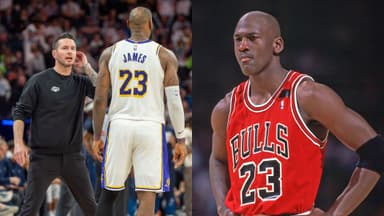One of the best parts of having the NBA on NBC back in our lives is the addition of Michael Jordan to the telecasts. His Airness has mostly refrained from commenting on the game since he’s been retired, so it’s been refreshing to hear his takes with Mike Tirico on MJ: Insights to Excellence.
Advertisement
This week MJ took on the topic of load management, a fraught one given the divide between the “rub some dirt in it” mentality of his generation and the much more cautious attitude in today’s sports science era.
Unsurprisingly, Jordan wasn’t a fan of the idea of load management. But he did have a much more nuanced take than simply saying that his generation was tougher than today’s players. Jordan’s entire career was built on an incomparable competitive fire and the need to be the best.
He told Tirico he tried to play every game because “It was an opportunity to prove … The fans are there to watch me play — I wanna impress that guy way up on top who probably worked his ass off to get a ticket.”
Tirico was skeptical that Jordan was thinking about an opposing fan up in the nosebleeds, but MJ emphatically told him that he did care about that. “Yeah, because I know he’s probably yelling at me and I want to shut him up,” he said. “You have a duty that if they’re wanting to see you, and as an entertainer, I wanna show.”
MJ did draw a line at playing through injury, saying he didn’t expect someone to jeopardize their health in that way. “Physically, if I can’t do it, then I can’t do it. But physically if I can do it, and I just don’t feel like doing it, that’s a whole different lens,” he added.
That means playing through pain and bumps and bruises and illness, and he pointed to his famous Flu Game in the 1997 Finals as an example of the responsibility he felt to be on the court.
Carmelo Anthony is also a new part of NBC’s NBA coverage, and he addressed Jordan’s comments on his 7PM in Brooklyn podcast. Melo is closer to the modern generation than Jordan is, but he always had more of an old school mentality.
As such, he agreed with Jordan’s take, and he made a further distinction to separate the older and more chronically injured players from those who just take a night off now and again, or as he put it, “This bucket of just, ‘I don’t want to play.'”
“If you can play, play,” he said. “If you hurt, sit your a** out, you know what I mean?” Melo said the big difference now is that if someone has a hurt ankle, they sit out. In MJ’s day, they’d wrap it up and fight through it, but he acknowledged that doing that could lead to worse injuries since players often compensate in other ways. “That thought process of having to prove yourself when you’re hurt today, it’s out the window,” he declared.
Melo’s cohost Kazeem Famuyide played devil’s advocate by saying, “One could make the argument that Michael Jordan didn’t have to chase a Steph Curry around for 48 minutes.” Steph is famous for his non-stop motor and he changed the game with his ability to stretch the floor, but Melo wasn’t having it.
“There were guys that played like that back in the day,” he said. “Reggie Miller played like that. Mark Price played like that.”
Melo is fighting against the foolish stereotype that Jordan played against milkmen and plumbers in his career. It’s an argument often brought up by those who see LeBron James as the GOAT because of the better talent pool they believe he competed against. But there was no shortage of great players in Jordan’s era, so it’s always been a silly comparison to make.
Melo’s mindset strikes a fair balance between old and new school. “Let’s separate the eras,” he said, pointing out that sports science didn’t exist three decades ago. If it did, maybe it would have prevented some injuries from occurring, but just because it’s here now doesn’t mean that players should use it as a cover to sit when they don’t need to.
“If we can prevent the injury by load management, then let’s do it,” he said. “I’m all for that. But there’s certain guys who need it, and there’s certain guys who we just go out there and play.”
Teams will continue trying to find the right balance between avoiding injuries through preventative measures and allowing players to play until they need direct treatment. In the meantime, the generational debate will likely continue forever.








